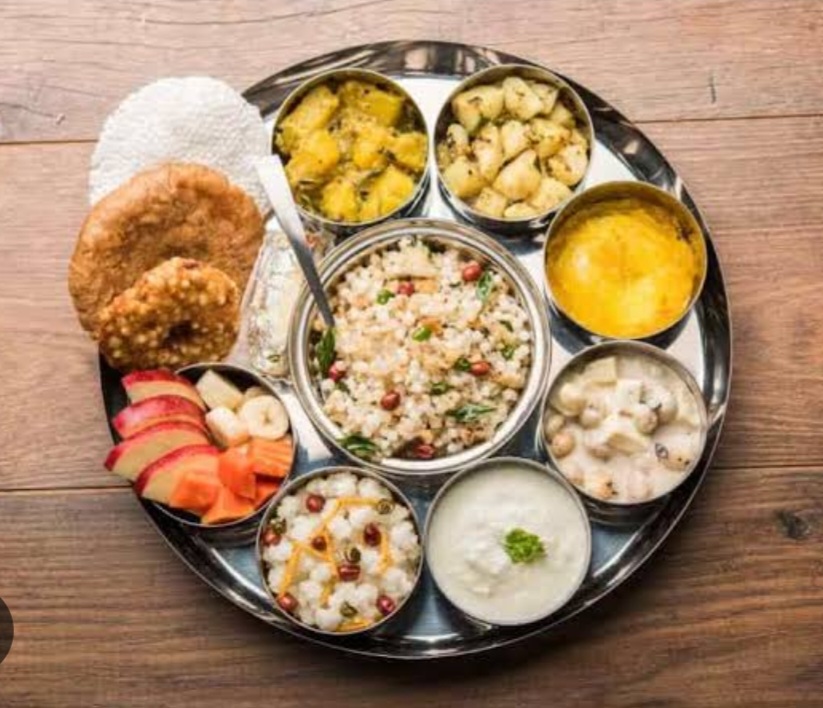Navratri is the season for garba, Durga pooja and fasting. While garba and the pooja festivities are being enjoyed, I was contemplating as to why do people fast? Apparently they wish to wash away their sins, indulge in a little soul nourishing and generally feel good about being involved in a spiritual activity of sorts. I wonder who coined the term "fast" for an activity which is actually to slow things down, I would like to believe even our metabolism slows down, perhaps to enable us to reflect on our inner self. Then why this term, well I suppose English is not a scientific language, such dichotomies are not unusual. Incidentally in Hindi a fast can be a simple "vrat" which most of us observe, where we don't have to resort to total abstinence from food and intake is permitted with certain restrictions or it can be "upwas", where one has to totally abstain from food.
Most of us follow the former, i.e. "vrat", observe a fast, where we can actually 'feast'. Traditionally at home, we have been observing these "f(e)asts" on some special occasions such as Maha Shivratri, Krishna Janmashtami and during Maha-Ashtami both the Spring and Autumn ones. As kids we would eagerly await these festivals, as the ‘carte du jour’ was a splendid spread of mouth watering delicacies and the best part was
that it was supposed to be partaken as a spiritual activity. Apart from the basket of choicest seasonal fruits, the fare commenced with tapioca pearls commonly known as Sago or Sabudana, its khichdi and kheer with generous dose of potato chips as accompaniments, thereafter there were sweets such as ‘halwa’, no, not the usual Wheat or Gram Flour one, but made from flour of the exotic sounding ‘water chestnut’ or Singhara in common parlance. Now don’t be disheartened if you feel that the traditional breads and vegetables are off the menu, you are in for a surprise, pooris or parathas of flour made out of kattu or rajgira or singhara is permitted with certain vegetables such as bottle gourd or the all weather potatoes which the French refer to as 'Pom de Terre' meaning "apple of the earth". Of course Yogurts, Cheese and all other dairy products are more than welcome, which implies that desserts such as Shrikhand too forms part of the menu during the spring months. Some of us would naturally scoff at this concept and practice of fasting but mind you we must consider the original purpose of indulging in this supposed abstinence, well it was to be mindfully aware of all the activities which we involved ourselves with, or in other words be ‘meditative’. So here we are, savoir in our belief that we are totally immersed in the gastronomic delights, and thereby embarking on the path of spirituality. In
North India, people generally abstain from alcohol and non-vegetarian food during this period and their penance is such that on the Dushehra day itself they not only vanquish Ravan but all the demons in the form of poultry and livestock with vengeance and enjoy their favourite elixirs to celebrate the occasion. The officers messes in Indian Army also adhere to the Tuesdays abstinence unwritten rule where no non-vegetarian food is served and the tipplers have to suffer a dry day.
Interestingly while all the religions follow some sort of fasting during certain holy periods, Islam during Ramadan, Christianity during Lent, Jains and Buddhists too, but Zorostrians or Parsis don't have any such qualms. Mahatma Gandhi introduced fasting as a non violent means to achieve an end. Hippocrates who is supposedly the father of 'medical fasting', advocated it in certain cases where the patient is prescribed 'abstinence from food' as the preferred mode of treatment. These days of course we hear about 'intermittent fasting' where the person is expected to abstain for a fixed number of hours in a day, i.e. generally refrain for about 16 hours in a day. Doctors confirm that autophagy (consumption of body's own tissues) commences when the body is starved of nutrition which is a healthy process and helps rejuvenate the body.
Be that as it may, as far as I am concerned, with my lean built I am convinced any autophagy will result in extreme starvation so for us the feast form of fasting has been ordained by the Almighty Himself, so just bring them on..

9 comments:
Great read. As an expression and practice of self control and discipline, fasting finds many forms. Always wondered how the Jantar Mantar protesters remain cherubic and in good cheer despite days of fasting!!
In northern India you eat more than you fast ! Good business in the name of Navratri Thali , Tikki , sabudana etc etc .
A very good read….
Lovely
My mouth is salivating, just reading your post.
Sanat
An interesting and captivating perspective on 'fast' !
I relished vrat thalis and the preparations mentioned in your composition during the last nine days. Bhandari Lal's vrat thalis was the best compared to Haldiram's. Still lost 2.50 Kg during the festival.
I like such breaks from feastings.
Kuldeep Singh
A Very Comprehensive & Holistic Coverage of " Holy Indulgences".
Interesting read.
Religio-cultural f(e)easting is a thread which unifies us Indians across regions and practices!
Post a Comment